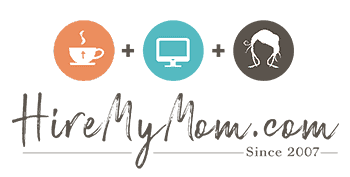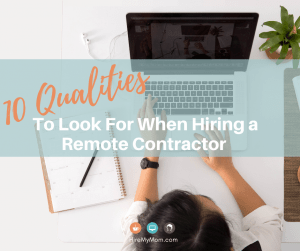5 Things You Need to Know Before Hiring an Independent Contractor

Hiring an independent contractor is a big step. It often means that your business is growing and that you are ready to take the next step to bigger and better things. Now that you’ve found the right person and agreed on a scope of work, it’s time to roll up your virtual sleeves and get to work, right?
Not so fast.
While the paperwork required to hire a contractor is much less than a regular employee, there are still important documents that must be completed and collected. Here’s an overview of the who, what, why, where, and how of forms needed when you hire an independent contractor.
Who Qualifies as an Independent Contractor
Let’s start with the who. Any person or business you hire to do work on your behalf, but not as an employee is an independent contractor.
Usually, independent contractors are in a different business than your own. For example, freelancers like artists, editors and writers are often independent contractors. Independent contractors can also include outside companies doing work for you on an ongoing basis. Think cleaning service, an attorney, or a tax prep person. Basically, independent contractors include anyone you are paying for services and who is not an employee.
The Internal Revenue Service (IRS) has set guidelines for determining if someone is an employee or an independent contractor. As a rule of thumb:
- You pay independent contractors for the result of their work.
- You pay employees for the ability to control how the work is done.
Why Independent Contractor Status Matters
When you hire an independent contractor, you aren’t required to withhold federal or state taxes or Social Security and Medicare taxes (collectively known as payroll taxes) from their pay. That’s because rather than paying them a salary or a wage, your business is paying another business for services.
Independent contractors are self-employed/owners of their own business and are responsible for reporting their income and paying the associated taxes. (You can learn more from irs.gov.)
When you hire people as employees, you are responsible for withholding the appropriate payroll taxes. This applies for part-time, full-time, and seasonal employees.
When to Call the Pros
Issues around employment status and taxes can be thorny. The IRS offers some guidelines for making this determination. But, it’s wise to consult an attorney or accountant with specific questions or for advice when hiring people or businesses to do work on your behalf. While this article is a good overview of your obligations when hiring independent contractors, we aren’t attorneys and we don’t practice law here at HireMyMom.com.
Start a File for Each Contractor
Before we talk about which forms to collect from your contractor and when, let’s take a step back and consider why it’s important to collect them. While you aren’t required to share information about your independent contractors with the IRS, there are still good reasons for keeping a file on each contractor.
- Maintaining project overviews and any feedback you share with the contractor, helps you keep good records about your projects– including how and when they were completed, who did the work, and what you paid to have the work done.
- If you are ever audited, you can easily pull information about each contractor to share, as needed.
- Keeping a contractor file makes it easier for you to connect with contractors in the future.
Collecting the Right Forms
Collecting the correct forms from independent contractors is often an overlooked step that offers important benefits for your business and the contractor you are hiring. Securing the correct forms at the beginning of your relationship can set you up for greater success later. It’s easier to have the information on file before the project begins when you and your contractor are in more constant communication.
Collecting the forms early gives you peace of mind that you’ve checked all the boxes with your independent contractor. According to The Balance Small Business, there are several forms to collect and keep on file, including:
- A completed W-9 tax form. This form and directions to complete it are both available online at irs.gov and should be on file before you pay the contractor. Once you collect the W-9 form, hold on to it for your files in case you need to share it with an auditor. (You don’t need to send it to the IRS.)
- While you don’t need to withhold payroll taxes from an independent contractor, you are responsible for issuing them at 1099 Form for Non-Employee Compensation at the end of each calendar year.
- Independent contractors use the 1099 Form to report their business income to the IRS.
- A contract. When you start a new relationship with an independent contractor, establish the terms of your engagement with a written contract. The contact should:
- Outline that the person you are hiring is an independent contractor and not an employee. It’s important that the person you are hiring understands that you will not be withholding payroll taxes because he/she is not an employee.
- Stipulate who owns the finished work product. (This is especially important for creative services such as art work or design.)
- Outline the scope of work to be performed.
- Document billing rates, invoicing, payment processing and timing. Settling on this at the beginning of the project can make for a more productive relationship.
- A resume and reference information. You know why you hired this person to do work on your behalf, but keeping a resume and reference information on file makes it easier for others to review, if needed. You may even have your contractors complete an application so you can easily access pertinent information about them in the future.
Additional Forms to Consider
In addition to the items outlined above, your business may dictate the need for additional forms, according to The Balance Small Business. For example:
- A non-disclosure agreement (NDA). Sometimes called a confidentiality agreement, this gives you confidence that your independent contractor is not sharing your business plans or trade secrets with competitors or other businesses.
- A non-compete agreement puts restrictions on the contractor’s ability to take your customers or clients to a competitor. These documents tend to outline specific actions and timeframes where the restrictions apply.
- A non-solicitation agreement keeps an independent contractor from working for your competition while also doing work for you. This can be tricky because sometimes you want a contractor with expertise in your industry, which means he/she also works for other similar businesses.
Consult a lawyer if you are considering asking your contractor to sign any of these items. State laws vary considerably. Working with an attorney can help make sure that any steps you’re considering are legal and advisable based on your state, objectives, and situation.
We’d Love to Hear From You
Tell us how you found your independent contractor and the success you experienced.
Disclaimer. The information contained in this site is provided for informational purposes only, and should not be construed as legal advice on any subject matter. You should not act or refrain from acting on the basis of any content included in this site without seeking legal or other professional advice.


